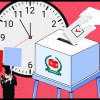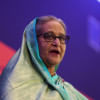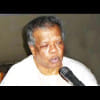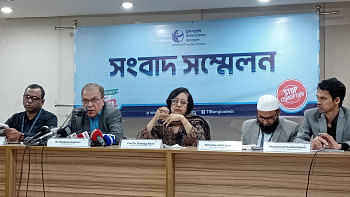'No' is tradition

There is no doubt that holding a fair and free election in a democratic manner brightens a ruling party's image. Why, then, do the parties in power seldom follow the path to take its image to new heights?
It is a paradox that a free and fair high-voltage election held in a democratic manner never went in favour of the party in power in this country.
Consider the history of election for the last two and a half decades. Neither the Awami League nor the BNP, when in power, has ever demonstrated political goodwill by holding free and fair parliamentary polls. They were only able to set examples of some good elections in the local government bodies.
The results in those good local elections however have disappointed them all the time as people cast ballots saying "NO" to the ways the party in power governed the country.
During the BNP-led government, elections to Dhaka and Chittagong City Corporation in 1994 and polls to Chittagong City Corporation again in 2005 were largely free and fair.
In those battles, the BNP-backed mayoral candidates faced humiliating defeat to their opponents supported by the then opposition AL.
Those two polls signaled that BNP's popularity had taken a nose dive and it faced defeat to the opposition AL in the subsequent parliamentary elections in June 1996 and in December 2008.
The AL-led government had brightened its image by demonstrating its political will to have free and fair polls to Chittagong City Corporation in 2010 and Rajshahi, Khulna, Barisal, Sylhet and Gazipur City Corporation in 2013.
But in all those polls, the high profile AL-backed mayoral contenders faced humiliating defeat to their comparatively low profile local opponents supported by BNP.
Even in Narayanganj City Corporation polls in 2011, the AL- backed mayoral candidate was defeated by a huge margin by another local AL leader not blessed by her party.
Political analysts believe the outcomes of the five city corporations' elections in 2013 had sown the seeds of the 2014 one-sided parliamentary elections and buried the prospect of fair elections.
The AL-led government, that abolished the caretaker government by amending the constitution in 2011, has refused to allow any non-partisan administration to conduct the 2014 parliamentary polls to stay in power.
On the other hand, the victory in the mayoral polls boosted the morale of BNP and the party declined to negotiate with the AL to devise any formula for a makeshift government during the election.
The 2014 parliamentary polls were held amid a boycott by the BNP-led alliance when 153 MPs were elected unopposed. Electoral anomalies even in the one-sided polls damaged the integrity of the electoral system.
Then the upazila parishad elections held from February to March in the same year further tainted the electoral system. Ruling AL men resorted to widespread electoral anomalies by capturing polling stations and stuffing ballot boxes to ensure their win and the defeat of their BNP opponents.
The elections to three city corporations in Dhaka and Chittagong City Corporations held in April this year were also mired in controversy for widespread stuffing of ballot boxes by ruling party men. The AL backed mayoral candidates won all the three mayoral posts in the controversial ballots.
SOME GOOD & BAD GENERAL ELECTIONS
Since restoration of democracy after the fall of the autocratic Ershad regime in1990, the parliamentary polls of 1991, 1996, 2001 and 2008 have set examples of good elections.
The elections were credible as there was no lack of political commitment of the then non-partisan caretaker governments. The fair polls however did not favour the immediate past ruling party all the time. People rejected them and opted for the opposition parties.
Before independence, two free and fair elections were held-- East Pakistan Legislative Assembly polls in 1954 and general election in 1970.
In the 1954 elections, the ruling Muslim League, that led the movement to create Pakistan in 1947, faced a humiliating defeat to Jukto Front, an alliance of Awami League, Krishak Sramik Party, Nezam-e-Islam and Ganatantri Dal.
The 1970 general election, though held under military ruler General Yahya Khan, was largely free, fair and credible. The result however was not liked by the ruling coterie. Awami League won a landslide by winning 160 out of 162 parliamentary seats in the East Pakistan.
In Bangladesh, the first general election in 1973 was an exception. There was no strong opposition party to challenge Awami League-led by Bangabandhu, the undisputed leader and founding father of the new nation. In that polls AL got a landslide victory. Yet, some electoral anomalies put to question the credibility of the polls.
The parties in power--BNP and Jatiya Party-- won the parliamentary elections held in 1979, 1986 and 1988. Those elections were held either under military or autocratic regime and did not enjoy credibility.
After restoration of democracy in 1990, BNP and AL were able to return to power through the two elections in February 1996 and January 2014. They were in power during the polls and the elections were not credible.
WHAT WILL HAPPEN TODAY?
It has been evident that a free, fair election is an outcome of a government's political commitment to have credible polls in addition to a strong leadership by the Election Commission.
This commitment is translated into action through the government administration actively maintaining congenial atmosphere for an acceptable election.
The party in power also contributes to this endeavor by encouraging its leaders and activists to conduct their electioneering in line with the laws.
But both are alarmingly absent in the run up to the municipality polls. There are reports of some ruling party men engaging in actions that are damaging good atmosphere for free and fair polls in some electoral areas. Some ministers and MPs were accused of violating the electoral code of conduct. The administration could not take strong steps against the violence.
The EC has not shown a strong determination against violence and violation of electoral laws. Neither the government nor the ruling party has made any visible efforts urging ministers, MPs and AL men to abide by the electoral laws. The AL rather eyes a win in the polls by defeating the BNP to show its popularity.
The prevailing situation has triggering fear of widespread violence and uncertainty over a fair election today.
The electoral democracy now faces further challenge. By the end of today it will be clear whether it will overcome the challenge or come under brutal attack again as it faced in past.

 For all latest news, follow The Daily Star's Google News channel.
For all latest news, follow The Daily Star's Google News channel. 








Comments